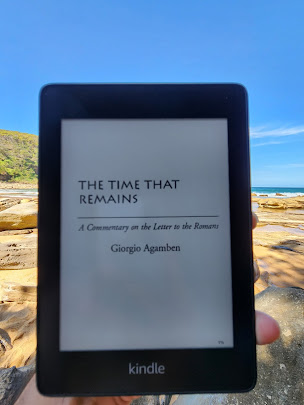Giorgio Agamben's The Time That Remains, Mini-Review
I like to write small reviews - recapitulations, really - of some of the books I've read. Here's one for Agamben's The Time that Remains: A Commentary on the Letter to the Romans:
It’s hard to get to the end of The Time That Remains without feeling that one has been tricked in some way. The avowed goal is straightforward enough: to “restore (Saint) Paul’s letters to the status of the fundamental messianic text for the Western tradition”. The method, even more so: to read and comment on the first ten words(!) of the first verse(!) of the Letter to the Romans as the means of such a restoration. One would think this would entail a simple exercise in exegesis, especially since the book's format is set up so as to go through the verse almost word by word - chapter two is on "calling" (Kletos), three on "separated" (Aphorismenos) and so on. Ten words in all, over six chapters. Easy, right? Not in the slightest! As it turns out, Agamben's commentaries are probably better thought of as 'opportunities' - one wants to say 'excuses' - for him to pursue his far-flung interests, exploring and adventuring in territory both near and, at times, maximally remote from what is given at face value.
Who would have thought, for instance, that the chapter on "calling" would lead into a rabbit hole that begins with Weber's book on the Protestant Ethic, winds its way toward a reflection on Marx's understanding of 'class', before engaging both Adorno and Kant, using the Pauline text as a basis for criticizing both? And that's just one chapter! This is then, a book of extreme density, with almost every second page developing points in unexpected directions, dipping in and out, not only of biblical hermeneutics, but also into the history of philosophy, along with a constellation of concepts all geared towards clarifying - or better, elaborating on - the nature of Pauline messianism. Indeed, for Agamben, Paul's letters are the book-end of an entire tradition of messianic meditations, on the other side of which lies Benjamin's Theses on the Philosophy of History, to which Paul's texts are strictly contemporary, despite the 2000 year gap between their composition.
It is just this contemporaneity which allows Agamben to skip between so much vast material in such a small span of space - the body of the text itself is no more than 140 or so pages, with the last 40 or so given over to Agamben's own translation of the Greek text, placed interlinearly as a point of reference. So what then, is the nature of the messianism at stake? Perhaps the best way to explain it is by means of Agamben's own distinction between the messianic and the eschatological (or, what is the same, between the messianic and the apocalyptic): where the apocalypse or the eschaton deals with the 'end of time' (what comes 'after' time, as it were), the messianic deals with, precisely, 'the time that remains'. The time 'in between' ordinary time, and time's end. However, more than just a chronological marker (a 'when'), messianic time also marks a kind of quality of time: a temporality in which time achieves a kind of relation to its own end (thus not the 'end of time', but a 'time of the end'), transforming itself from within (Agamben calls it a 'time within time').
Exactly how to parse this is complex - clearly! - and at best here I can gesture toward, at least, the specificity of what the messianic 'is' for Agamben. If anything, what The Time That Remains excels at is precisely in developing the sprawling ramifications and implications of thinking time in this way. More than messianism, one will find in here Agamben's reflections on the Pauline origin of Hegel's concept of 'aufhebung' (sublation), the Christian origins of rhyme (like... rhyme as a literary device as such), a critique of deconstruction as a 'thwarted messanism', and as ever, Agamben ongoing critique of the law - among other things. The ambition and erudition on display here is (typically) awe-inducing, and as usual with Agamben, The Time That Remains fits as a fractal piece of his larger philosophical project, with call-backs and forwards to his other works. Most notably, I think, his The Sacrament of Language (whose stakes TTTR clarifies in a way not found in that book!), and Remnants of Auschwitz, insofar as there is more here about the concept of the 'remnant' than there is in that book (v. annoyed about this!).




Comments
Post a Comment